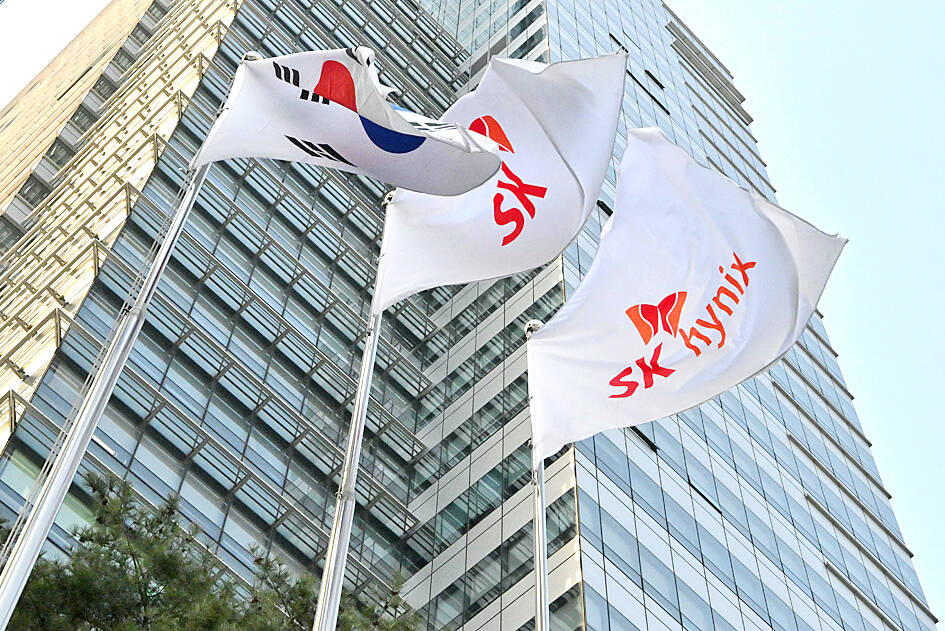South Korean chipmaker SK Hynix Inc has chosen the state of Indiana for a cutting-edge facility in the US, the Financial Times reported yesterday.
SK Hynix is considering a possible investment in the US but hasn’t made a final decision yet, the world’s second-largest memorychip maker said in a statement to Reuters.
The company’s new packaging plant in Indiana will specialize in stacking standard DRAM chips to create high-bandwidth memory (HBM) chips, before integrating them with Nvidia Corp’s graphic processing units (GPUs), the report said, citing sources.

Photo: AFP
SK Hynix currently produces its HBM chips in South Korea. Subsequently, they are shipped to Taiwan, where they are integrated by Taiwan Semiconductor Manufacturing Co (TSMC, 台積電) into Nvidia’s GPUs, alongside other TSMC-made processors, FT reported.
HBM chips are used to help Nvidia’s accelerators in training artificial intelligence (AI), which has been one of the sector’s most promising markets.
SK Hynix returned to profit last quarter after four consecutive quarters of losses driven by demand for chips used in AI, the company said last week.
The company posted an operating profit of 346 billion won (US$259.4 million) for the October-December period, compared with a loss of 1.9 trillion won in the same period a year earlier, with strong sales of its flagship products DDR5 and HBM3.
Those sales increased more than four and five times each respectively last year, the company said, with strong demand for chips used in mobile applications as well as AI.
SK Hynix said its sales increased 47 percent to 11.3 trillion won in the fourth quarter year-on-year.
However, it still recorded a full-year loss of 9.1 trillion won because of the year-long downturn.
Additional reporting by AFP

Semiconductor business between Taiwan and the US is a “win-win” model for both sides given the high level of complementarity, the government said yesterday responding to tariff threats from US President Donald Trump. Home to the world’s largest contract chipmaker, Taiwan Semiconductor Manufacturing Co (TSMC, 台積電), Taiwan is a key link in the global technology supply chain for companies such as Apple Inc and Nvidia Corp. Trump said on Monday he plans to impose tariffs on imported chips, pharmaceuticals and steel in an effort to get the producers to make them in the US. “Taiwan and the US semiconductor and other technology industries

SMALL AND EFFICIENT: The Chinese AI app’s initial success has spurred worries in the US that its tech giants’ massive AI spending needs re-evaluation, a market strategist said Chinese artificial intelligence (AI) start-up DeepSeek’s (深度求索) eponymous AI assistant rocketed to the top of Apple Inc’s iPhone download charts, stirring doubts in Silicon Valley about the strength of the US’ technological dominance. The app’s underlying AI model is widely seen as competitive with OpenAI and Meta Platforms Inc’s latest. Its claim that it cost much less to train and develop triggered share moves across Asia’s supply chain. Chinese tech firms linked to DeepSeek, such as Iflytek Co (科大訊飛), surged yesterday, while chipmaking tool makers like Advantest Corp slumped on the potential threat to demand for Nvidia Corp’s AI accelerators. US stock

The US Federal Reserve is expected to announce a pause in rate cuts on Wednesday, as policymakers look to continue tackling inflation under close and vocal scrutiny from US President Donald Trump. The Fed cut its key lending rate by a full percentage point in the final four months of last year and indicated it would move more cautiously going forward amid an uptick in inflation away from its long-term target of 2 percent. “I think they will do nothing, and I think they should do nothing,” Federal Reserve Bank of St Louis former president Jim Bullard said. “I think the

SUBSIDIES: The nominee for commerce secretary indicated the Trump administration wants to put its stamp on the plan, but not unravel it entirely US President Donald Trump’s pick to lead the agency in charge of a US$52 billion semiconductor subsidy program declined to give it unqualified support, raising questions about the disbursement of funds to companies like Intel Corp and Taiwan Semiconductor Manufacturing Co (台積電). “I can’t say that I can honor something I haven’t read,” Howard Lutnick, Trump’s nominee for commerce secretary, said of the binding CHIPS and Science Act awards in a confirmation hearing on Wednesday. “To the extent monies have been disbursed, I would commit to rigorously enforcing documents that have been signed by those companies to make sure we get